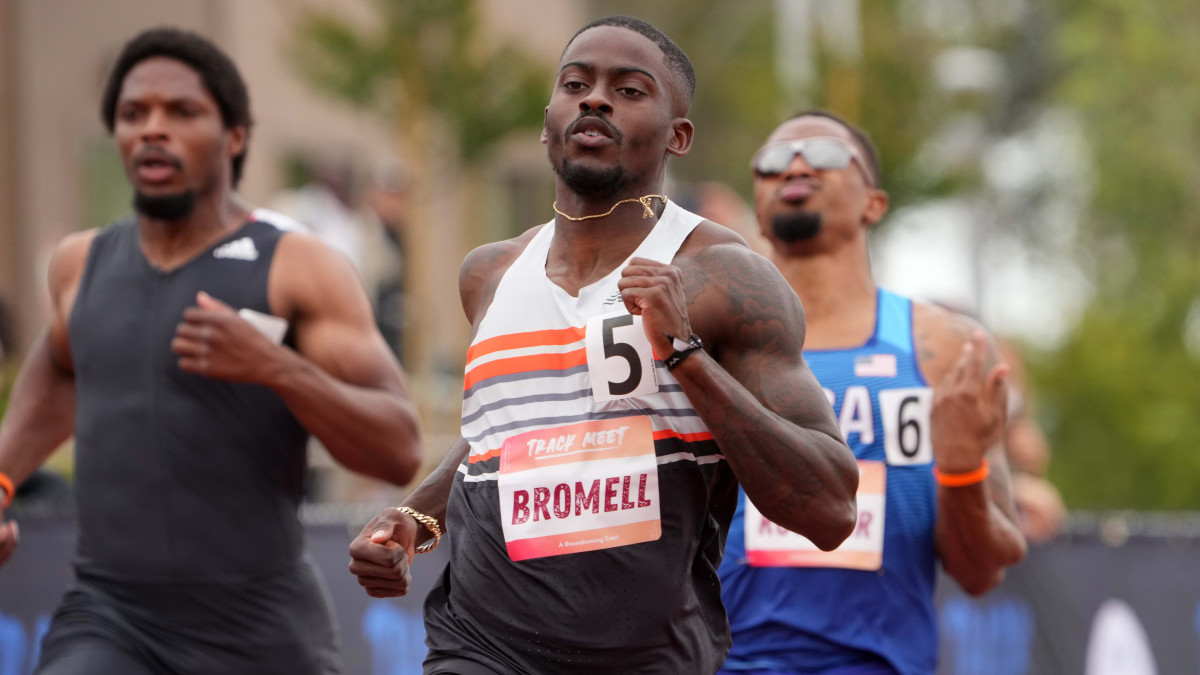
The Trayvon Bromell Comeback Story Gets A Chapter in Tokyo
EUGENE — Although the stadium has seen a $270 million facelift, it was in Eugene where Trayvon Bromell rose to stardom when he became the first 18-year-old to break 10 seconds for the 100 meters as a Baylor freshman at the 2014 NCAA Championships. By 21, he had won a world championship bronze medal and headed into the Olympic Trials as a favorite to make the team. With a nagging bone spur in his Achilles, he made the team with a runner-up finish in 9.84 at the trials. It would be his fastest time up until this April.
Sunday evening, he reigned supreme in the men’s 100 meter final at the U.S. Olympic Trials with a 9.80 victory that he made look easy.
After aggravating the Achilles injury and getting wheeled off the track in Rio de Janeiro following the men’s 4x100m relay, he underwent surgery after the Olympics and didn’t race again until June 22, 2017 when he was bounced in the first round of the 2017 U.S. Outdoor Championships in Sacramento. The heel required another surgery, which led him to question his future in the sport.
“I was just at a halt,” Bromell told me last August. “It was a big turn for me and not knowing where I was going to land in all of this and understanding how my future will go. I hit a blank spot asking, ‘What’s next for me?’”
His return to racing wouldn’t come until June 8, 2019 but he still didn’t look like old self and didn’t break 10 seconds again until July 2020. The pandemic and Olympic postponement allowed him an extra year to continue to get healthy and get back to racing. On June 5th, he clocked a 9.77 at a small meet in Miramar, Fla. that puts him atop the world list and in the conversation for gold.
Tokyo will crown the first Olympic champion without the last name Bolt since 2004. (However, two others were possibly born this week for 2041.) It will not be reigning world champion Christian Coleman, who remains suspended through November for missing three drug tests within a 12-month span.
Ronnie Baker and Fred Kerley, who finished second and third respectively in 9.85 and 9.86, will head to their first Olympics. For Kerley, a bold decision paid off. Just two years ago, he earned a silver medal at the world championships in Doha but trusted in his training and decided to contest the 100m and 200m at the Olympic Trials. The risk paid off and he landed on the team for Tokyo.
Other notable news from Day 3
- Hayward Field erupted in cheers as Allyson Felix closed powered through the final 100 meters to finish second in the women’s 400 meter final and qualify for her fifth Olympics and first as a mother. At 35 years old, Felix can add to her collection of nine Olympic medals (six gold and three silver). She can tie and pass Carl Lewis for the most Olympic medals by an American with a podium finish in the women’s 400 meters and possibly the 4x400 or mixed 4x400 relay. The race was won by Quanera Hayes in 49.78 and the final spot for Tokyo was occupied by Wadeline Jonathas rounding out the podium in 50.03.
- Michael Norman, the fastest man in the last Olympic cycle with a personal best of 43.45, won the men’s 400 meters in 44.07. In Japan, he will try to become the first U.S. men’s Olympic gold medalist in the event since LaShawn Merritt in 2004. Michael Cherry was the runner-up in 44.35. 2021 NCAA champion Randolph Ross, who is the son of 2004 Olympian Duane Ross, will head to his first Olympics thanks to a third-place finish in 44.72. The North Carolina A&T star will be joined by his teammate Trevor Stewart at the Games since his fourth-place finish in 44.90 will likely secure him a spot on the 4x400 relay team.
- Keni Harrison, who finished sixth at the U.S. Olympic Trials in 2016 and went on to break the world record by running 12.20 just a few weeks later, got her redemption by winning this year’s final in 12.47. She edged out Brianna McNeal, who earlier this year was banned 5 years for tampering with part of a doping control process and is appealing to the Court of Arbitration for Sport. A final decision will be released in the coming weeks whether she will be able to compete. Christina Clemons took third in 12.51 to make her first Olympic team.
- 2016 Olympian Rudy Winkler, a former Cornell graduate who now works in cyber security, broke Lance Deal’s American hammer throw record of 82.52m (270-9), which stood since 1996. Winkler launched a 82.71m (271-4) heave on his second throw of the day. His worst throw of the day was 76.91m (261-2), which would have still won him the competition. Winkler now will try to become the first American medalist in the hammer throw since Deal in 1996. Daniel Haugh (79.39) and Alex Young (78.32) will also represent the United States in Tokyo.
- In the first heat of the women’s steeplechase, former Utah All-American Grayson Murphy pulled away from the field in the final 200 meters to notch a personal best and the Olympic standard in 9:25.37. Her push also dragged BYU’s Courtney Wayment under the qualifying mark. They now just need to finish in the top three to make the Olympic team. The United States has been represented by American record holder Courtney Frerichs, Olympic bronze medalist and 2017 world champion Emma Coburn and 2016 Olympian Colleen Quigley at every global championship since 2016. Quigley withdrew from the trials due to an injury setback so at least one spot has opened up for Tokyo. Coburn and Frerichs safely advanced to the final on Thursday at 8:47 p.m. PDT.




